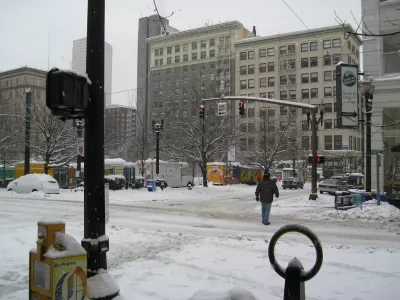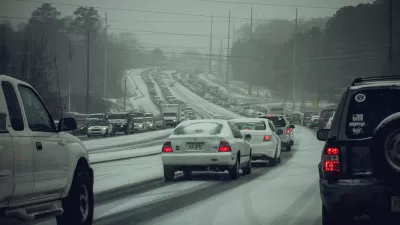Following in the footsteps of the "snowmageddon" events experienced by Atlanta in January 2014, Portland, Oregon had a surprising amount of difficulty with a small amount of snow this week.

Gillian Flaccus of the Associated Press shares news of the effects of a rare snowstorm in Portland, Oregon on Wednesday, December 14, 2016. The local story made the national news for its depiction of a crippled commute, abandoned cars, and closed schools.
Picking up the news for Bike Portland, Jonathan Maus contributed a critical perspective about why the day went so wrong.
Here’s the inconvenient truth: Our over-reliance on single-occupancy motor vehicle use has real consequences. It leads to lots of injuries and deaths, it poisons our lungs, and it makes our transportation system extremely fragile and inefficient.
To further that point, Maus shared an infographic illustrating the "Hierarchy of Mobility Resiliency." At the top "Feet." At the bottom "Cars." Maus's argument comes as a response to an article by The Oregonian, neglecting Maus's point but laying the blame on these five causes:
- Portland doesn't salt roads.
- Motorists don't carry chains.
- Drivers aren't experienced in snowy conditions.
- Portland doesn't have many snow plows.
- Transit doesn't reach to many parts of the city.
Also writing for The Oregonian, Lizzy Acker found enough good humor to scour social media for snarky takes on the whole bad snow day.
While Portland's considering how this snow storm had such a crippling effect on the city, it might want to consider the example of Atlanta, which was shut down for several days in January 2014 by just a few inches of snow. The event, dubbed "snowmaggedon," was also described by many commentators as a result of auto dependency.
FULL STORY: Winter Storm Snarls Portland Traffic, Stranding Thousands

Planetizen Federal Action Tracker
A weekly monitor of how Trump’s orders and actions are impacting planners and planning in America.

Congressman Proposes Bill to Rename DC Metro “Trump Train”
The Make Autorail Great Again Act would withhold federal funding to the system until the Washington Metropolitan Area Transit Authority (WMATA), rebrands as the Washington Metropolitan Authority for Greater Access (WMAGA).

DARTSpace Platform Streamlines Dallas TOD Application Process
The Dallas transit agency hopes a shorter permitting timeline will boost transit-oriented development around rail stations.

Renters Now Outnumber Homeowners in Over 200 US Suburbs
High housing costs in city centers and the new-found flexibility offered by remote work are pushing more renters to suburban areas.

The Tiny, Adorable $7,000 Car Turning Japan Onto EVs
The single seat Mibot charges from a regular plug as quickly as an iPad, and is about half the price of an average EV.

Supreme Court Ruling in Pipeline Case Guts Federal Environmental Law
The decision limits the scope of a federal law that mandates extensive environmental impact reviews of energy, infrastructure, and transportation projects.
Urban Design for Planners 1: Software Tools
This six-course series explores essential urban design concepts using open source software and equips planners with the tools they need to participate fully in the urban design process.
Planning for Universal Design
Learn the tools for implementing Universal Design in planning regulations.
Municipality of Princeton
Roanoke Valley-Alleghany Regional Commission
City of Mt Shasta
City of Camden Redevelopment Agency
City of Astoria
Transportation Research & Education Center (TREC) at Portland State University
US High Speed Rail Association
City of Camden Redevelopment Agency
Municipality of Princeton (NJ)



























